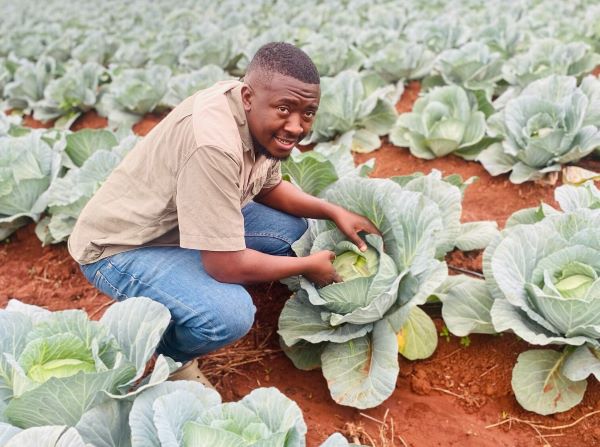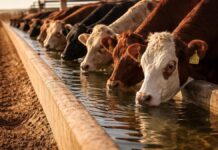By Zablon Oyugi
When Masala Mpheni Ligege, a former metallurgist, now a young farmer from Duthuni Village in Limpopo resigned from his career line in March this year, adapting to the situation out of employment was not easy as the thought of looking for another job kept tempting.
“I had five interviews prior to starting farming and in the process, some turned me down, some gave offers that I felt were low salaries,” said the 31 years old Masters graduate in Metallurgical Engineering from Tshwane University of Technology and diploma holder in Extractive Metallurgy from the University of Johannesburg.
Mpheni’s decision to enter the farming industry was driven by the sustainability and profitability it offers, especially in the face of challenges such as those brought about by the COVID-19 pandemic. He recognized the potential for growth and stability in agriculture.
“I had to study and understand other businesses and not only did I find that farming could be rewarding but seeing the effects other industries faced during the Covid-19 pandemic, farming was a sustainable and profitable industry and I decided to get into it instead,” he said adding that beside the farming business, he is building a restaurant to incorporate his passion for food and art into food security.
Initial Investment
Mpheni’s journey into agriculture began with a modest investment, utilizing his provident fund. He carefully allocated his resources to start his farming venture, prioritizing essential expenses like irrigation and seedlings.
“Funding was a gamble; I started without savings but rather all the money I received from the provident fund, which was R75,000.00. I used it to de-bush, clean and prepare the soil on the 1.8 hectares farm, which cost R5,000.00. I used R40,000.00 to buy and set up the drip irrigation system and R8,000.00 to buy seedlings. The rest of the money I used to buy fertilizers, insecticides, water license application, labor, and marketing.
He decided to start with growing cabbages, a move he says is one of the turning points in his farming venture and one which provided him with the financial means to expand his operations.
“I harvested 15000 cabbages whose sales started on 1st of September 2023, and by the second week, every single cabbage was sold. Seeing the pace the sales were going at, that’s when I decided to stop applying for jobs and focus more on farming by getting more land and expanding the venture.
Diverse Productions
Mpheni’s farm is not limited to cabbages, butternuts, and pigs that he is currently involved in. He recognizes the potential of diversifying his production with fruit trees and expanding into agri-consultation services, showcasing his commitment to innovation and growth.
“I have acquired 12 hectares land which already has mangoes, litchi, and avocado trees. Now I’m pruning them to make them fruitful during their seasons. I am also learning and establishing an Agri-consultation department within my company,” said the new and enterprising farmer in South Africa.
Future Plans:
Looking ahead, Mpheni who has since named his venture Duthuni Farm and Projects Primary Cooperative Limited which already has two permanent employees and six casuals envisions a thriving agricultural enterprise with diversified services and products.
Despite the challenges, he remains committed to his vision of a prosperous future for Duthuni Farm.
“The company will have a consultation department, mixed animal production, plant hire, value-added products, and a centralized market where it sells its produce without going to the markets. Despite the backlog in fundings by the government, our potential is big, and to achieve all these would need external fundings.”
Youth in Agriculture
Mpheni acknowledges the initial challenges of attracting young people to agriculture but believes that the industry’s potential for reducing youth unemployment is significant. He aims to make farming more appealing and engaging for the younger generation.
“It is not a fashionable industry for us. It is quite slow and not very tech-savvy. As a young farmer myself, it was boring when I started and not a neat environment. But using my lean Principles I improved it and made it neat and fun. As youth unemployment rises, the industry holds great potential to alleviate it and would encourage more young people to engage in it.”
Masala Mpheni Ligege’s remarkable journey from metallurgy to agriculture serves as an inspiration to all those who dare to embrace change and venture into new and unfamiliar territories.
His story highlights the opportunities and potential for growth in the agriculture industry, and his vision for the future of Duthuni Farm demonstrates his unwavering commitment to success and innovation.









I am so proud of you Masala. You are truly an inspiration to us all.
Comments are closed.